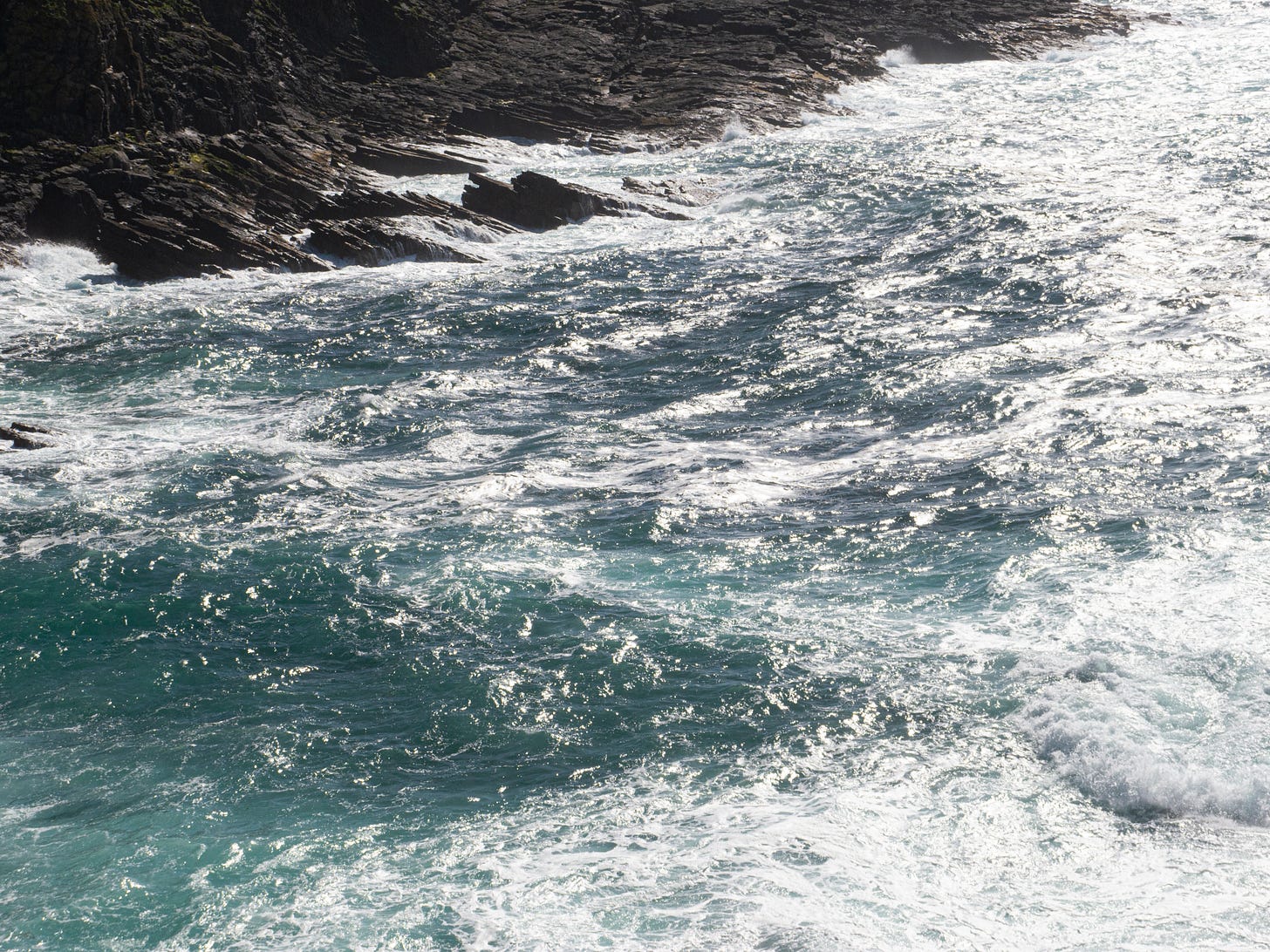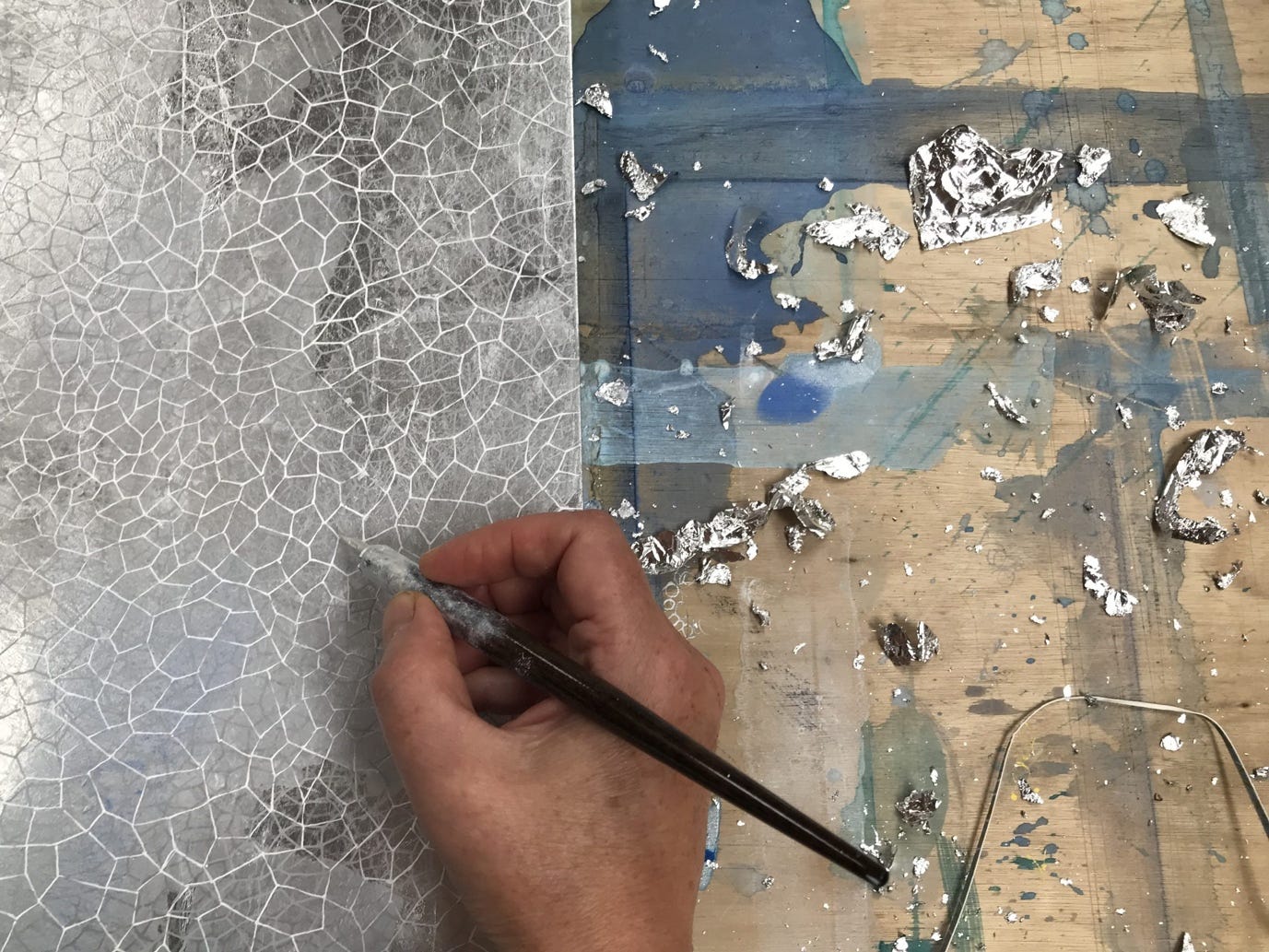Gathering the flow of attention
If you want to find happiness, stop looking for it. Instead, seek 'flow'.
It’s been kind of windy here for the last couple of days. This being Orkney, it’s hardly a surprising state of affairs. But actually, we’ve had an unusually calm summer this year. No big gales have rolled in to shred the garden. Tender petals have gone unbruised, and the green leaves have not been browned at the edges by the salt. Until now.
It’s the change in the soundscape you notice first. I stepped out of the back door this morning to a steady roar that might be the sea, or just the wind itself tumbling in over the land, brawling through the dog rose and thundering its way around and into my ears. The chickens came tottering out for their breakfast, their fluffy rumps turned inside out as they staggered a little in the gusts. Around the house, assorted whistlings and rattlings we haven’t heard all summer are back. The chimney rumbles with a low, hollow booming sound that’s more felt than heard, like the biggest pipe on a church organ. The rubber seal around my studio door has set up an insistent buzz like someone playing kazoo, as the wind finds its way through some tiny hole that I can’t locate exactly and so remains unstopped. It may still be warm and green outside, but the sounds of winter are returning.
I’d forgotten how the wind jostles at everything, including my mind. Things flicker at the edge of my eye and distract me. The willow hedge I planted as shelter belt streams in this brisk southwesterly like the mane of a galloping horse. A leaf, torn loose, tumbles across the track and takes my train of thought along with it. The swallows fling themselves around recklessly, slicing into the wind then sliding with it, as if enjoying the game. Abruptly, they tumble away to vanish into the sky and I’m gone too…where was I? Oh yes, writing this.
Re-finding flow
This distracted, windblown skittering of mind makes the discipline of creative work more of a challenge. It took me much longer than usual to settle to the task of writing this newsletter today. I made false starts, got up to do a random job I suddenly remembered, started tasks I don’t need to do right now, set them down again. I fiddled and fretted and fussed. I considered giving in to the wind’s restlessness and heading out for a walk instead, to see the sea churning and watch the barley ripple.
But this jittery state also reminds me of what art does. It gathers up our haphazard psychic energy, brings it into alignment and takes us somewhere deeper. Both making art and engaging with it entrains our wayward attention, that forever wants to skitter off, and brings us back to ourselves.
I’m sure you know the feeling. The mind circles a few times then, reluctantly, grumblingly, settles itself, like a dog taking to its bed once it accepts that the desired walk is not forthcoming. From there, focus begins to gather. Momentum builds. It’s taken a while but now you’re in. Absorbed. Now you wonder why it was so hard to get started.
This is the state of mind that the psychologist Mihaly Csikszentmihalyi called ‘flow’. I’ve written about it before, but ‘flow’ is an idea that helped me regain my footing this morning and I hope it helps you too, so I’m revisiting Csikszentmihalyi’s ideas today.
Flow, according to Csikszentmihalyi (pronounced, I’m told, Chick-sent-mee-hal-yee), is the psychological state of energised focus and full immersion in an activity in which we lose our sense of time. It isn’t quite joy exactly. It’s a kind of serious play that engages us deeply, motivates us, energises us and brings deep intrinsic satisfaction. No wonder we want more of it in our lives.
Csikszentmihalyi wasn’t only concerned with flow states achieved through creativity. The activities he examines include sports, business, religious practices, work of many kinds. But what characterises each of these, he finds, is that they are challenging tasks that we choose for ourselves, tasks that are achievable, but stretch us.
Flow makes us happier
Flow is really about understanding what makes us happy. Indeed, Csikszentmihalyi’s 1990 book ‘Flow’, was subtitled, in my 2002 edition, ‘the classic work on how to achieve happiness’. And the good news is that this is a happiness that doesn’t depend on external circumstances. We can choose it. Csikszentmihalyi writes:
Happiness is not something that happens. It is not the result of good fortune or random choice. It is not something that money can buy or power command. It does not depend on outside events, but, rather, on how we interpret them. Happiness, in fact, is a condition that must be prepared for, cultivated and defended privately by each person. People who learn to control inner experience will be able to determine the quality of their lives, which is as close as any of us can come to being happy.
Yet we cannot reach happiness by consciously searching for it…it is by being fully involved with every detail of our lives, whether good or bad, that we find happiness, not by trying to look for it directly.
Happiness ensues…it’s an unintended side-effect of what Auschwitz survivor Viktor Frankl described as ‘one’s personal dedication to a course greater than oneself.’ The satisfaction and enjoyment we gain from flow is of a far richer quality than the pleasures we gain from more passive or hedonistic activities.
Flow makes us smarter
Each time we achieve a challenging goal we have ourselves chosen to pursue – learning to play a new piece of music, writing a poem, knitting a sock – we become stronger, happier, more confident, more integrated.
The state of flow enlarges our self by immersing it in something larger. But Csiksentmihalyi, a scientist at heart, is at pains to point out that there is nothing mysterious or mystical going on:
When a person invests all her psychic energy into an interaction – whether it is with another person, a boat, a mountain, or a piece of music – she in effect becomes part of a system of action greater than what the individual self had been before. This system takes its form from the rules of the activity; its energy comes from the person’s attention. But it is a real system – subjectively as real as being part of a family, a corporation, or a team – and the self that is part of it expands its boundaries and becomes more complex that what it had been.
To enter a state of flow we need to strike a delicate balance between anxiety (too hard) and boredom (too easy). Get this balance right and the energised focus of flow pushes us towards growth and learning.
Flow has the potential to make life more rich, intense, and meaningful; it is good because it increases the strength and complexity of the self.
Flow trains our minds
Flow is also effective resistance to the chaos of the mind left to its own devices:
We don’t usually notice how little control we have over the mind, because habits channel psychic energy so well that thoughts seem to follow each other by themselves without a hitch….the social roles culture prescribes then take care of shaping our minds for us, and we generally place ourselves on automatic pilot till the end of the day when is it time again to lose consciousness in sleep. But when we are left alone, with no demands on our attention, the basic disorder of the mind reveals itself. With nothing to do, it begins to follow random patterns, usually stopping to consider something painful or disturbing. Unless a person knows how to give order to his or her thoughts, attention will be attracted to whatever is most problematic at the moment: it will focus on some real or imaginary pain, on recent grudges or long term frustrations. Entropy is the normal state of consciousness – a condition that is neither useful nor enjoyable.
This morning I definitely felt that uncomfortable state of random, compulsive rumination described here as ‘entropy’. Indeed, it started as soon as I awoke. For me, both drawing and writing are ways to entrain my mind’s scattered attention and bring it to bear on a specific subject in a focused way. These are activities that always return me to myself, even if sometimes, like today, I resist them at first. For you it might be cooking, knitting, yoga, doing crosswords, walking, meditation, playing music, golf. This is flow.
Flow channels our wayward and often catastrophising mental energy and gives it a job. It’s the shepherd that takes the untrained collie worrying at sheep and trains it to herd them into a pen. Flow asserts our control over our attention, and therefore of our own internal experience.
When adversity threatens to paralyze us, we need to reassert control by finding a new direction in which to invest psychic energy, a direction that lies outside the reach of external forces. When every aspiration is frustrated, a person still must seek a meaningful goal around which to organize the self. Then, even though that person is objectively a slave, subjectively he is free.
Flow is subversive
So, next time you are tempted to ask yourself what’s the point of creative work when the external rewards can be so scant and uncertain, remember this: It’s not trivial. It’s the path to inner freedom, even happiness.
Because there is a reason why every authoritarian and totalitarian government seeks first to put its artists and writers in jail. There’s a reason why some governments and societies deliberately undermine the arts by chronically underfunding them, cutting arts education, telling us the arts and humanities are trivial, unserious, not a ‘proper’ career. Because a life of deep engagement with creative work will shape us into authentic, independent-minded, clear thinking, self-directed, free citizens.
And not everybody wants that for us.
If you enjoyed reading this, please do share this with someone you think might enjoy it too.
Meanwhile, in the studio…
I’ve been wrapping and packing the artwork that’s going out to galleries for two shows I’ve got coming up. This lot is for my solo show CONFLUENCE at Northlight Gallery in Stromness next week. The preview is on Saturday 9th September, from 2-4pm. Do come along if you can!
And, in the space that’s opened up, I picked up some golf leaf a friend sent me ages ago, and a bit of gnarled heather that I’ve had pinned to my wall for about ten years…and this happened! It’s a fiddly task and unfinished, but, you know, flow.
I love creative surprises! What do you think?
May you too find flow this week,
Sam








Brilliant!
I love this whole piece, and how you say “Flow is Subversive,” because it’s TRUE!
I also love Csiksentmihalyi's book FLOW, and in particular I love how you write,
"Flow is subversive.
So, next time you are tempted to ask yourself what’s the point of creative work when the external rewards can be so scant and uncertain, remember this: It’s not trivial. It’s the path to inner freedom, even happiness." LOVE this!!!✨🌟💖🙏🕊️